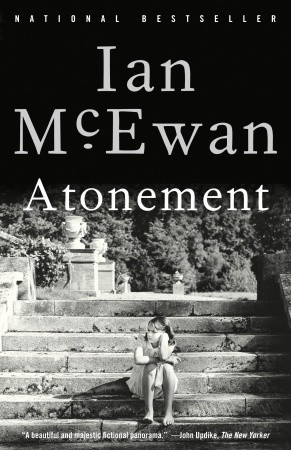People invent stories to defend or promote themselves, to entertain or challenge or plead with their audience, to offer some vision of the world as it should be, and to attack the world as it is. For each of these reasons, the central character in Ian McEwan’s Atonement tells and re-tells the same tale throughout her life. The novel follows her from early adolescence to old age as she revisits a horrible decision from her past, distorting it, rationalizing it, and ultimately trying to atone for it in simple, powerful prose.
McEwan, the 1998 Booker Prize-winning author of Amsterdam, was rightfully nominated again for Atonement. His gorgeous and disturbing sentences serve a tight plot, a vast array of twentieth century settings, and several characters so socially and economically diverse that they recall the major works of the Victorian era. The novel speeds along with great intensity, even as it addresses family dissolution and the history of Western storytelling. It demands to be read in two or three sittings at most.
We begin with an English manor in 1935. The house bustles with activity, none of it especially momentous: a dinner is planned, a play is rehearsed, an ancient heirloom is handled carelessly and shattered. Robbie, the housekeeper’s son, is responsible. He types a letter of apology to Cecilia, the daughter of his boss, and adds the ill-considered lines, “In my dreams I kiss your cunt, your sweet wet cunt. In my thoughts I make love to you all day long.” Although he rewrites the letter without this addendum, the version that ends up in Cecilia’s hands is the X-rated rough draft. Cecilia realizes her love for Robbie, and the two of them begin to fornicate in the library.
But Briony intrudes on this pornographic scene. She’s thirteen, confused, over-dramatic, and fond of her older sister Cecilia. She concludes that Robbie is attacking Cecilia, but cannot bring herself to tell her mother. The evening culminates in the unexpected outdoor assault of a fifteen year-old cousin, which Briony witnesses from afar, without being able to identify the attacker. Her active imagination invites her to accuse Robbie, whose vulgar letter is discovered. All of the characters believe Briony’s story, with the exception of Robbie’s mother and Cecilia. In the course of the evening, Briony has ruined the lives of her sister and friend, and condemned herself to sixty years of solitary torment.
This night alone seems to be worthy material for a full-length novel, but McEwan has more ambitious goals. The story continues for another one hundred and fifty pages on the battlegrounds of France in 1941, in the military hospitals of London throughout World War II, and finally, back at the Tallis manor in 1999. The consequences of the pivotal evening unfold in arresting, entirely plausible detail: Robbie fights for the Allies, Cecilia renounces her family and trains as a nurse, and Briony follows her sister’s example. McEwan skillfully withholds crucial information for as long as possible: Will Cecilia and Robby reunite and reach some sort of peace? Will Briony begin her atonement?
It would be unfair to reveal the fates of these three characters, since one of the novel’s greatest strengths is its intricate series of unexpected twists. Almost every image and line of dialogue takes on tremendous meaning by the end, including this seemingly innocuous description of Briony:
She was one of those children possessed by a desire to have the world just so. Whereas her big sister’s room was a stew of unclosed books, unfolded clothes, unmade bed, unemptied ashtrays, Briony’s was a shrine to her controlling demon: the model farm spread across a deep window ledge consisted of the usual animals, but all facing one way—toward their owner—as if about to break into song, and even the farmyard hens were neatly corralled.
With his characteristic switch from a pithy observation to a lengthier, lyrical, beautifully detailed sentence, McEwan seems to offer up a cute portrait of a compulsively orderly little girl. But the passage works on a more ominous level throughout the book: Briony accuses Robbie of rape, and later tries to atone for the accusation, because of her signature desire “to have the world just so.”
Tiny but crucial details accumulate in the increasingly complicated plot. By no means should McEwan get away with this story: in a summary, Briony’s single-handed destruction of at least two lives seems unbelievable at best. But McEwan manages to maintain both the plausibility and riveting momentum of the narrative from start to finish. He scatters the damning evidence against Robbie (and against the real attacker) with the skill of a veteran crime novelist.
As if the meticulously constructed sentences and intricacies of the plot were not enough of a delight, Atonement captures an enormous range of settings with enviable ease. McEwan inhabits the mind of a weary upper-class British matron of the thirties as easily as he navigates the battlefields of World War II. Imagine if Jane Austen began a novel with her characteristic attention to muted passions and social foibles, only to plunge into a racy sex scene, a rumored kidnapping, and a harrowing depiction of military life. Such are the pleasures of this wildly ambitious new novel.
The conclusion attempts to answer McEwan’s central question: how Briony can begin to atone for her thoughtless behavior. Like most other aspects of the plot, the answer unfolds as a mystery, with a few false solutions to distract the reader until the startling revelation of the final pages. Suffice it to say that Briony looks for comfort in the act of storytelling: in a return to the tale that she’s narrated evasively, dishonestly, and defensively since that awful night in 1935. McEwan tracks her through sixty years of compelling, delicately rendered anguish. Whether or not she finds atonement, it’s a joy to join her in the search.

